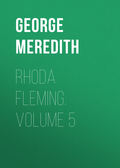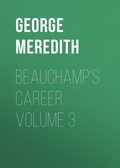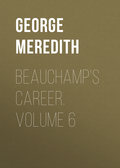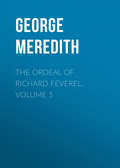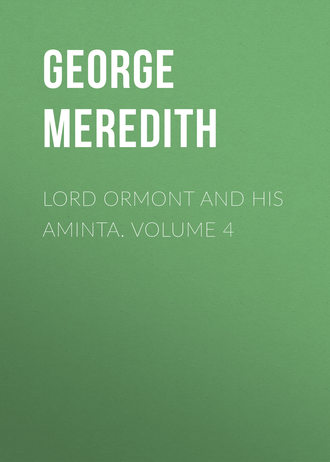
George Meredith
Lord Ormont and His Aminta. Volume 4
Hearing from Weyburn that the chariot was bound to go through Winchester, she spoke of a brother, a baker there, the last surviving member of her family and, after some talk, Weyburn offered to deliver a message of health and greeting at the baker's shop. There was a waving of hands, much nodding and curtseying, as the postillion resumed his demi-volts— all to the stupefaction of Mrs. Pagnell; but she dared not speak, she had Morsfield on the mouth. Nor could she deny the excellent quality of the bread and butter, and milk, too, at the sign of the Jolly Cricketers. She admitted, moreover, that the food and service of the little inn belonged in their unpretentious honesty to the, kind we call old English: the dear old simple country English of the brotherly interchange in sight of heaven—good stuff for good money, a matter with a blessing on it.
'But,' said she, 'my dear Aminta, I do not and I cannot understand looks of grateful affection at a small innkeeper's wife paid, and I don't doubt handsomely paid, for her entertainment of you.'
'I feel it,' said Aminta; tears rushed to her eyelids, overflowing, and her features were steady.
'Ah, poor dear! that I do understand,' her aunt observed. 'Any little kindness moves you to-day; and well it may.'
'Yes, aunty,' said Aminta, and in relation to the cause of her tears she was the less candid of the two.
So far did she carry her thanks for a kindness as to glance back through her dropping tears at the sign-board of the Jolly Cricketers; where two brave batsmen cross for the second of a certain three runs, if only the fellow wheeling legs, face up after the ball in the clouds, does but miss his catch: a grand suspensory moment of the game, admirably chosen by the artist to arrest the wayfarer and promote speculation. For will he let her slip through his fingers when she comes down? or will he have her fast and tight? And in the former case, the bats are tearing their legs off for just number nought. And in the latter, there 's a wicket down, and what you may call a widower walking it bat on shoulder, parted from his mate for that mortal innings, and likely to get more chaff than consolation when he joins the booth.
CHAPTER XXI
UNDER-CURRENTS IN THE MINDS OF LADY CHARLOTTE AND LORD ORMONT
Another journey of travellers to London, in the rear of the chariot, was not diversified by a single incident or refreshed by scraps of dialogue. Lady Charlotte had her brother Rowsley with her, and he might be taciturn,—she drove her flocks of thoughts, she was busily and contentedly occupied. Although separation from him stirred her mind more excitedly over their days and deeds of boy and girl, her having him near, and having now won him to herself, struck her as that old time's harvest, about as much as can be hoped for us from life, when we have tasted it.
The scene of the invasion of Steignton by the woman and her aunt, and that man Morsfield, was a steel engraving among her many rapid and featureless cogitations. She magnified the rakishness of the woman's hand on hip in view of the house, and she magnified the woman's insolence in bringing that man Morsfield—to share probably the hospitality of Steignton during the master's absence! Her trick of caricature, whenever she dealt with adversaries, was active upon the three persons under observation of the windows. It was potent to convince her that her brother Rowsley had cast the woman to her native obscurity. However, Lady Charlotte could be just: the woman's figure, and as far as could be seen of her face, accounted for Rowsley's entanglement.
Why chastize that man Morsfield at all? Calling him out would give a further dip to the name of Ormont. A pretty idea, to be punishing a roan for what you thank him for! He did a service; and if he's as mad about her as he boasts, he can take her and marry her now Rowsley 's free of her.
Morsfield says he wants to marry her—wants nothing better. Then let him. Rowsley has shown him there 's no legal impediment. Pity that young Weyburn had to be sent to do watch-dog duty. But Rowsley would not have turned her back to travel alone: that is, without a man to guard. He 's too chivalrous.
The sending of Weyburn, she now fancied, was her own doing, and Lady Charlotte attributed it to her interpretation of her brother's heart of chivalry; though it would have been the wiser course, tending straight and swift to the natural end, if the two women and their Morsfield had received the dismissal to travel as they came.
One sees it after the event. Yes, only Rowsley would not have dismissed her without surety that she would be protected. So it was the right thing prompted on the impulse of the moment. And young Weyburn would meet some difficulty in protecting his 'Lady Ormont,' if she had no inclination for it.
Analyzing her impulse of the moment, Lady Charlotte credited herself, not unjustly, with a certain considerateness for the woman, notwithstanding the woman's violent intrusion between brother and sister. Knowing the world, and knowing the upper or Beanstalk world intimately, she winked at nature's passions. But when the legitimate affection of a brother and sister finds them interposing, they are, as little parsonically as possible, reproved. If persistently intrusive, they are handed to the constable.
How, supposing the case of a wife? Well, then comes the contest; and it is with an inferior, because not a born, legitimacy of union; which may be, which here and there is, affection; is generally the habit of partnership. It is inferior, from not being the union of the blood; it is a matter merely of the laws and the tastes. No love, she reasoned, is equal to the love of brother and sister: not even the love of parents for offspring, or of children for mother and father. Brother and sister have the holy young days in common; they have lastingly the recollection of their youth, the golden time when they were themselves, or the best of themselves. A wife is a stranger from the beginning; she is necessarily three parts a stranger up to the finish of the history. She thinks she can absorb the husband. Not if her husband has a sister living! She may cry and tear for what she calls her own: she will act prudently in bowing her head to the stronger tie. Is there a wife in Europe who broods on her husband's merits and his injuries as the sister of Thomas Rowsley, Earl of Ormont does? or one to defend his good name, one to work for his fortunes, as devotedly?
Over and over Lady Charlotte drove her flocks, of much the same pattern, like billows before a piping gale. They might be similar—a puffed iteration, and might be meaningless and wearisome; the gale was a power in earnest.
Her brother sat locked-up. She did as a wife would not have done, and held her peace. He spoke; she replied in a few words—blunt, to the point, as no wife would have done.
Her dear, warm-hearted Rowsley was shaken by the blow he had been obliged to deal to the woman—poor woman!—if she felt it. He was always the principal sufferer where the feelings were concerned. He was never for hurting any but the enemy.
His 'Ha, here we dine!' an exclamation of a man of imprisoned yawns at the apparition of the turnkey, was delightful to her, for a proof of health and sanity and enjoyment of the journey.
'Yes, and I've one bottle left, in the hamper, of the hock you like,' she said. 'That Mr. Weyburn likes it too. He drank a couple coming down.'
She did not press for talk; his ready appetite was the flower of conversation to her. And he slept well, he said. Her personal experience on that head was reserved.
London enfolded them in the late evening of a day brewing storm. My lord heard at the door of his house that Lady Ormont had not arrived. Yet she had started a day in advance of him. He looked down, up and round at Charlotte. He looked into an empty hall. Pagnell was not there. A sight of Pagnell would, strange to say, have been agreeable.
Storm was in the air, and Aminta was on the road. Lightning has, before now, frightened carriage-horses. She would not misconduct herself; she would sit firm. No woman in England had stouter nerve—few men.
But the carriage might be smashed. He was ignorant of the road she had chosen for her return. Out of Wiltshire there would be no cliffs, quarries, river-banks, presenting dangers. Those dangers, however, spring up when horses have the frenzy.
Charlotte was nodded at, for a signal to depart; and she drove off, speculating on the bullet of a grey eye, which was her brother's adieu to her.
The earl had apparently a curiosity to inspect vacant rooms. His Aminta's drawing-room, her boudoir, her bed-chamber, were submissive in showing bed, knickknacks, furniture. They told the tale of a corpse.
He washed and dressed, and went out to his club to dine, hating the faces of the servants of the house, just able to bear with the attentions of his valet.
Thunder was rattling at ten at night. The house was again the tomb.
She had high courage, that girl. She might be in a bed, with her window- blind up, calmly waiting for the flashes: lightning excited her. He had seen her lying at her length quietly, her black hair scattered on the pillow, like shadow of twigs and sprays on moonlit grass, illuminated intermittently; smiling to him, but her heart out and abroad, wild as any witch's. If on the road, she would not quail. But it was necessary to be certain of her having a trusty postillion.
He walked through the drench and scream of a burst cloud to the posting- office. There, after some trouble, he obtained information directing him to the neighbouring mews. He had thence to find his way to the neighbouring pot-house.
The report of the postillion was, on the whole, favourable. The man understood horses—was middle-aged—no sot; he was also a man with an eye for weather, proverbially in the stables a cautious hand—slow 'Old Slow-and-sure,' he was called; by name, Joshua Abnett.
'Oh, Joshua Abnett?' said the earl, and imprinted it on his memory, for the service it was to do during the night.
Slow-and-sure Joshua Abnett would conduct her safely, barring accidents.
For accidents we must all be prepared. She was a heroine in an accident.
The earl recalled one and more: her calm face, brightened eyes, easy
laughter. Hysterics were not in her family.
She did wrong to let that fellow Morsfield accompany her. Possibly he had come across her on the road, and she could not shake him off. Judging by all he knew of her, the earl believed she would not have brought the fellow into the grounds of Steignton of her free will. She had always a particular regard for decency.
According to the rumour, Morsfield and the woman Pagnell were very thick together. He barked over London of his being a bitten dog. He was near to the mad dog's fate, as soon as a convenient apology for stopping his career could be invented.
The thinking of the lesson to Morsfield on the one hand, and of the slow- and-sure postillion Joshua Abriett on the other, lulled Lord Ormont to a short repose in his desolate house. Of Weyburn he had a glancing thought, that the young man would be a good dog to guard the countess from a mad dog, as he had reckoned in commissioning him.
Next day was the day of sunlight Aminta loved.
It happens with the men who can strike, supposing them of the order of civilized creatures, that when they have struck heavily, however deserved the blow, a liking for the victim will assail them, if they discover no support in hatred; and no sooner is the spot of softness touched than they are invaded by hosts of the stricken person's qualities, which plead to be taken as virtues, and are persuasive. The executioner did rightly. But it is the turn for the victim to declare the blow excessive.
Now, a just man, who has overdone the stroke, will indemnify and console in every way, short of humiliating himself.
He had an unusually clear vision of the scene at Steignton. Surprise and wrath obscured it at the moment, for reflection to bring it out in sharp outline; and he was able now to read and translate into inoffensive English the inherited Spanish of it, which violated nothing of Aminta's native 'donayre,' though it might look on English soil outlandish or stagey.
Aminta stood in sunlight on the greensward. She stood hand on hip, gazing at the house she had so long desired to see, without a notion that she committed an offence. Implicitly upon all occasions she took her husband's word for anything he stated, and she did not consequently imagine him to be at Steignton. So, then, she had no thought of running down from London to hunt and confound him, as at first it appeared. The presence of that white-faced Morsfield vindicated her sufficiently so far. And let that fellow hang till the time for cutting him down! Not she, but Pagnell, seems to have been the responsible party. And, by the way, one might prick the affair with Morsfield by telling him publicly that his visit to inspect Steignton was waste of pains, for he would not be accepted as a tenant in the kennels, et caetera.
Well, poor girl, she satisfied her curiosity, not aware that a few weeks farther on would have done it to the full.
As to Morsfield, never once, either in Vienna or in Paris, had she, warmly admired though she was, all eyes telescoping and sun-glassing on her, given her husband an hour or half an hour or two minutes of anxiety. Letters came. The place getting hot, she proposed to leave it.
She had been rather hardly tried. There are flowers we cannot keep growing in pots. Her fault was, that instead of flinging down her glove and fighting it out openly, she listened to Pagnell, and began the game of Pull. If he had a zest for the game, it was to stump the woman Pagnell. So the veteran fancied in his amended mind.
This intrusive sunlight chased him from the breakfast-table and out of the house. She would be enjoying it somewhere; but the house empty of a person it was used to contain had an atmosphere of the vaults, and inside it the sunlight she loved had an effect of taunting him singularly.
He called on his upholsterer and heard news to please her. The house hired for a month above Great Marlow was ready; her ladyship could enter it to-morrow. It pleased my lord to think that she might do so, and not bother him any more about the presentation at Court during the current year. In spite of certain overtures from the military authorities, and roused eulogistic citations of his name in the newspapers and magazines, he was not on friendly terms with his country yet, having contracted the fatal habit of irony, which, whether hitting or musing its object, stirs old venom in our wound, twitches the feelings. Unfortunately for him, they had not adequate expression unless he raged within; so he had to shake up wrath over his grievances, that he might be satisfactorily delivered; and he was judged irreconcilable when he had subsided into the quietest contempt, from the prospective seat of a country estate, in the society of a young wife who adored him.
An exile from the sepulchre of that house void of the consecration of ashes, he walked the streets and became reconciled to street sunlight. There were no carriage accidents to disturb him with apprehensions. Besides, the slowness of the postillion Joshua Abnett, which probably helped to the delay, was warrant of his sureness. And in an accident the stringy fellow, young Weyburn, could be trusted for giving his attention to the ladies—especially to the younger of the two, taking him for the man his elders were at his age. As for Pagnell, a Providence watches over the Pagnells! Mortals have no business to interfere.
An accident on water would be a frolic to his girl. Swimming was a gift she had from nature. Pagnell vowed she swam out a mile at Dover when she was twelve. He had seen her in blue water: he had seen her readiness to jump to the rescue once when a market-woman, stepping out of a boat to his yacht on the Tabus, plumped in. She had the two kinds of courage— the impulsive and the reasoned. What is life to man or woman if we are not to live it honourably? Men worthy of the name say this. The woman who says and acts on it is—well, she is fit company for them. But only the woman of natural courage can say it and act on it.
Would she come by Winchester, or choose the lower road by Salisbury and Southampton, to smell the sea? perhaps-like her!—dismissing the chariot and hiring a yacht for a voyage round the coast and up the Thames. She had an extraordinary love of the sea, yet she preferred soldiers to sailors. A woman? Never one of them more a woman! But it came of her quickness to take the colour and share the tastes of the man to whom she gave herself.
My lord was beginning to distinguish qualities in a character.
He was informed at the mews that Joshua Abnett was on the road still. Joshua seemed to be a roadster of uncommon unprogressiveness, proper to a framed picture.
While debating whether to lunch at his loathed club or at a home loathed more, but open to bright enlivenment any instant, Lord Ormont beheld a hat lifted and Captain May saluting him. They were near a famous gambling-house in St. James's Street.
'Good! I am glad to see you,' he said. 'Tell me you know Mr. Morsfield pretty well. I'm speaking of my affair. He has been trespassing down on my grounds at Steignton, and I think of taking the prosecution of him into my own hands. Is he in town?'
'I 've just left his lame devil Cumnock, my lord,' said May, after a slight grimace. 'They generally run in tandem.'
'Will you let me know?'
'At once, when I hear.'
'You will call on me? Before noon?'
'Any service required?'
'My respects to your wife.'
'Your lordship is very good.'
Captain May bloomed at a civility paid to his wife. He was a smallish, springy, firm-faced man, devotee of the lady bearing his name and wielding him. In the days when duelling flourished on our land, frail women could be powerful.
The earl turned from him to greet Lord Adderwood and a superior officer of his Profession, on whom he dropped a frigid nod. He held that all but the rank and file, and a few subalterns, of the service had abandoned him to do homage to the authorities. The Club he frequented was not his military Club. Indeed, lunching at any Club in solitariness that day, with Aminta away from home, was bitter penance. He was rejoiced by Lord Adderwood's invitation, and hung to him after the lunch; for a horrible prospect of a bachelor dinner intimated astonishingly that he must have become unawares a domesticated man.
The solitary later meal of a bachelor was consumed, if the word will suit a rabbit's form of feeding. He fatigued his body by walking the streets and the bridge of the Houses of Parliament, and he had some sleep under a roof where a life like death, or death apeing life, would have seemed to him the Joshua Abnett, if he had been one to take up images.
Next day he was under the obligation to wait at home till noon. Shortly before noon a noise of wheels drew him to the window. A young lady, in whom he recognized Aminta's little school friend, of some name, stepped out of a fly. He met her in the hall.
She had expected to be welcomed by Aminta, and she was very timid on finding herself alone with the earl. He, however, treated her as the harbinger bird, wryneck of the nightingale, sure that Aminta would keep her appointment unless an accident delayed. He had forgotten her name, but not her favourite pursuit of botany; and upon that he discoursed, and he was interested, not quite independently of the sentiment of her being there as a guarantee of Aminta's return. Still he knew his English earth, and the counties and soil for particular wild-flowers, grasses, mosses; and he could instruct her and inspire a receptive pupil on the theme of birds, beasts, fishes, insects, in England and other lands.
He remained discoursing without much weariness till four of the afternoon. Then he had his reward. The chariot was at the door, and the mounted figure of Joshua Abnett, on which he cast not a look or a thought. Aminta was alone. She embraced Selina Collett warmly, and said, in friendly tones, 'Ah! my lord, you are in advance of me.'
She had dropped Mrs. Pagnell and Mr. Weyburn at two suburban houses; working upon her aunt's dread of the earl's interrogations as regarded Mr. Morsfield. She had, she said, chosen to take the journey easily on her return, and enjoyed it greatly.
My lord studied her manner more than her speech. He would have interpreted a man's accurately enough. He read hers to signify that she had really enjoyed her journey, 'made the best of it,' and did not intend to be humble about her visit to Steignton without his permission; but that, if hurt at the time, she had recovered her spirits, and was ready for a shot or two—to be nothing like a pitched battle. And she might fire away to her heart's content: wordy retorts would not come from him; he had material surprises in reserve for her. His question concerning Morsfield knew its answer, and would only be put under pressure.
Comparison of the friends Aminta and Selina was forced by their standing together, and the representation in little Selina of the inferiority of the world of women to his Aminta; he thought of several, and splendid women, foreign and English. The comparison rose sharply now, with Aminta's novel, airy, homely, unchallengeing assumption of an equal footing beside her lord, in looks and in tones that had cast off constraint of the adoring handmaid, to show the full-blown woman, rightful queen of her half of the dominion. Between the Aminta of then and now, the difference was marked as between Northern and Southern women: the frozen-mouthed Northerner and the pearl and rose-nipped Southerner; those who smirk in dropping congealed monosyllables, and those who radiantly laugh out the voluble chatter.



